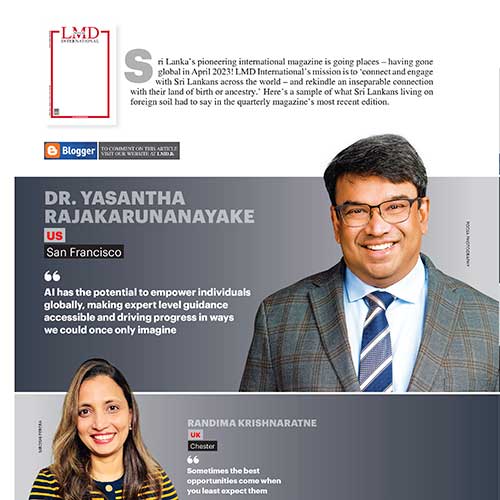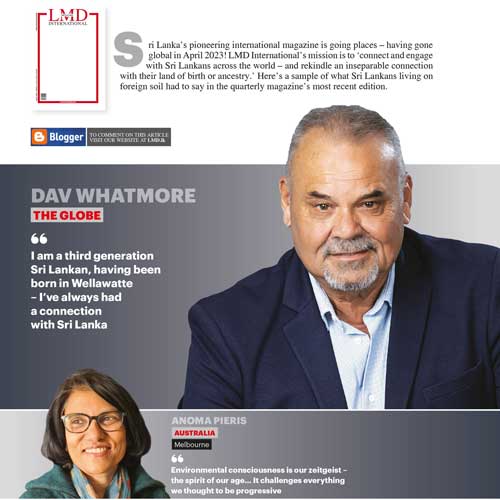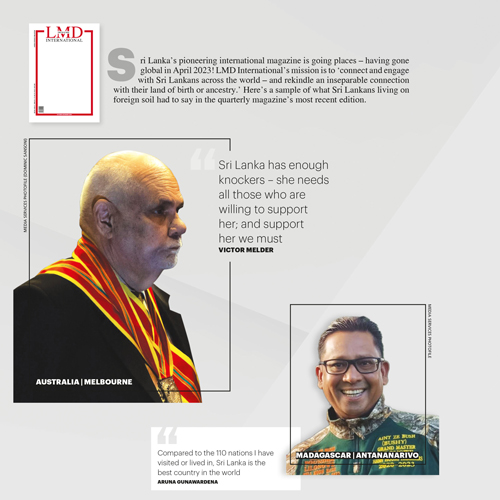SRI LANKANS OVERSEAS
 CELEBRATE DIVERSITY
CELEBRATE DIVERSITY
Shiyanthi Thavapalan recollects Sri Lanka’s cultural heritage
Q: As far as perceptions go, do you think Sri Lanka is regaining its composure in the aftermath of the Easter Sunday attacks?
A: Yes, in some ways. But this is a moment for caution and reflection. We must remember that these acts of terrorism were perpetuated by criminal individuals. So we must not permit our grief and anger to become tools of injustice.
We should be careful not to generalise an entire community or allow this to become an excuse to mobilise against vulnerable minority groups.
Q: How do you perceive Sri Lanka today – i.e. the progress or lack thereof?
A: Sri Lanka is a country with great potential that’s unable to shake off a legacy of violence, and is divided because of imagined differences and inherited prejudices. If we want real change, progress in education, human rights and healthcare should go hand in hand with considerations of economic growth and development.
Q: And how do citizens of the country you live in at present view Sri Lanka?
A: Those in my circle of friends and acquaintances think of Sri Lanka mainly as a holiday destination – a beautiful distant place to visit one day, hopefully with me so I can show them around!
A few people recall the civil war but most are not aware of the complicated colonial history of the island or the dynamic between various ethnic and religious groups. In academic circles, Sri Lanka is known for fostering brilliant anthropologists and sensitive writers.
Q: Likewise, how do other Sri Lankans living in your country of domicile view Sri Lanka?
A: People here want an independent justice system in Sri Lanka that’s impervious to manipulation by politicians or lobby groups.
Without this, there cannot be any progress. Moreover, there’s frustration that any opinion voiced by Western powers is immediately perceived as either interference or aggression.
Q: What were your impressions of Sri Lanka on your last visit and how much has it changed from the past?
A: I came back to Sri Lanka in February 2019 after 19 years of being away. And of all things, what brought me back there was work. I participated in an archaeological excavation that was taking place in my father’s village of Kandarodai in Jaffna with a team of local and international researchers.
While I thought it was going to be painful to revisit the vestiges of my past and see everything either gone or irrevocably changed, this was only partly true. Colombo has grown and developed. Balangoda – where my grandparents used to live and I spent my school holidays – is no longer a sleepy village.
But it wasn’t all about loss and memories that couldn’t be recaptured. I saw the same friendly spirit in people, and experienced their warm hospitality and generosity. Going back felt like heading home to something wholesome and familiar because of the people.
Q: From afar, how do you perceive news about Sri Lanka – and what mediums do you rely on to stay connected?
A: Mainly from the media outlets on websites. But there are local newspapers published by the Tamil community in Canada. For instance, I recently read E. V. Daniel’s Charred Lullabies – a wonderful study of ethnicity and violence in Sri Lanka.
Q: How do you view the brain drain? Why isn’t there a reversal of it, in your opinion?
A: I’m not sure that the brain drain is irreversible. There are many excellent historians and archaeologists who want to work in Sri Lanka.
But we must generate enthusiasm for its rich past, and create a research environment that is inclusive and collaborative. And we must stop letting cultural heritage become a tool for political power play.
Q: What should Sri Lanka focus on most in the coming decade?
A: Crack down on political corruption, protect minority rights and pay attention to the chief existential challenge facing us all – climate change.
Q: And what are your hopes for the country in the next decade or so?
A: I want Sri Lanka to become a peaceful and self-sufficient democracy; a nation that stands up for the civil rights of citizens and protects its natural resources.
Furthermore, I’d like to see our people take pride in and preserve the cultural heritage and traditions, which highlight the fact that it was always a place of diversity.










